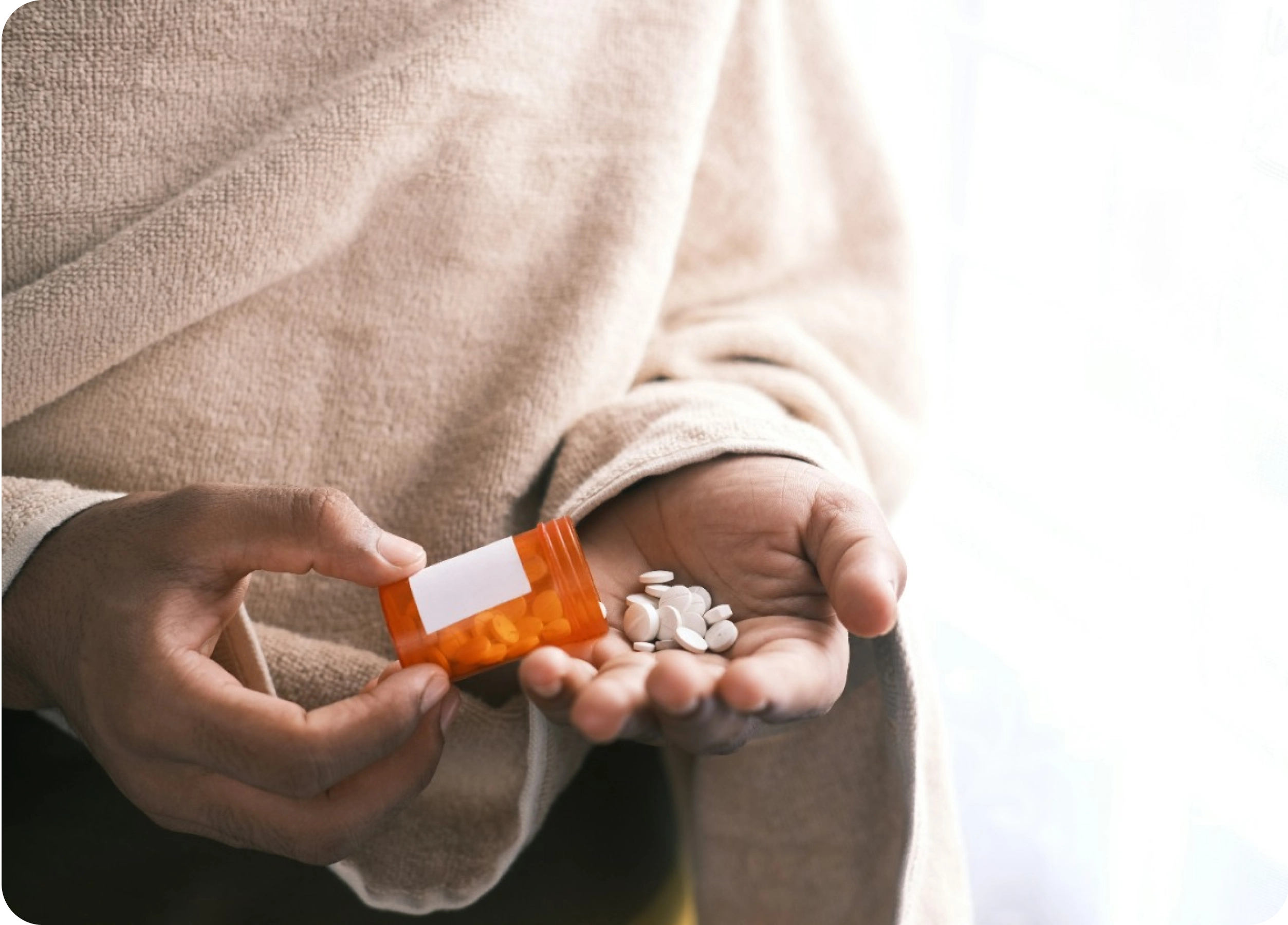Addiction Treatment: What is Addiction, and How is Addiction Treated?

Addiction isn’t a personal flaw. Addiction isn’t a lack of responsibility, bad morals, or a punishment for using drugs and alcohol. Addiction is a disease.
Seeking info about addiction?
Check out our comprehensive guide or reach out to us for more questions!
Table of Contents

What Is Addiction?
Addiction is a complex condition characterized by the compulsive use of a substance or engagement in a behavior, despite harmful consequences. It is considered a chronic brain disease that affects individuals on both a physical and psychological level.
There are many different types of addiction, including substance addictions (such as drug and alcohol addiction), behavioral addictions (such as gambling or gaming addiction), and even food addiction. Each type of addiction can have a significant impact on an individual's life, relationships, and overall well-being.

What Are the Different Types of Addiction?
Some of the most common types of addiction include:
Substance Addiction
Substance addiction is the most well-known form of addiction, and it involves the use of drugs, alcohol, or other substances that can cause physical or psychological dependence. Common abuse substances include opioids, cocaine, methamphetamine, alcohol, and nicotine.
Prescription drug addiction involves abusing prescription medications, such as painkillers and sedatives, intended to treat medical conditions. Prescription drug addiction can be just as serious as addiction to illegal drugs.
Behavioral Addiction
Behavioral addiction is characterized by compulsive behavior that a person cannot control, despite harmful consequences. Common behavioral addictions include gambling, gaming, internet addiction, sex addiction, and compulsive shopping.

Your Path to Sobriety Starts Here
Achieving sobriety is more than just overcoming addiction; it's about rediscovering yourself and the joys of life without dependency. We are here to guide you through every step of this life-changing journey. We will offer you understanding, support, and strategies you need to succeed.
Make today the day you choose change.

What Causes Addiction?
The exact cause of addiction is unknown, but it is believed to be a result of various factors, including genetics, environmental influences, and personal experiences. Some individuals may have a genetic predisposition to addiction, while others may turn to substances or behaviors as a coping mechanism for past traumas or stressors.
Some of the major factors considered to play a role in the development of addiction include:
Mental Health Disorders
Mental health disorders, such as depression, anxiety, or post-traumatic stress disorder (PTSD), can increase the risk of addiction. Individuals may use drugs or alcohol as a way to self-medicate, leading to the development of addiction.
Genetics
Addiction can run in families, indicating a genetic component to the disease. Certain genes may predispose individuals to addiction, making them more vulnerable to developing addiction in response to environmental factors.
Environmental Factors
Exposure to drugs or alcohol at an early age, social influences, and stress can all contribute to the development of addiction. Childhood trauma, such as abuse or neglect, can also increase the risk of addiction.
Brain Chemistry
Neurotransmitters in the brain, such as dopamine and serotonin, play a crucial role in addiction. Changes in the production, release, or reception of these neurotransmitters can contribute to the development of addiction.
Peer Pressure
Social factors, such as peer pressure, can also contribute to the development of addiction. Individuals may start using drugs or alcohol to fit in with a certain group, leading to the development of addiction over time.
Availability of Drugs
The availability of drugs or alcohol can also contribute to the development of addiction. Individuals who are exposed to drugs or alcohol in their environment may be more likely to develop addiction.

What Are Addictive Substances?
Addictive substances are psychoactive – they have some effect on the mind. Every addictive substance people abuse, from nicotine to heroin, affects the way the brain communicates with the body. Chiefly, addictive substances make us feel good. For a while, anyway.
There are seven basic kinds of drugs:
Depressants
Depressants make us feel calm and relaxed. Alcohol is a depressant, as are benzodiazepines like Xanax, GHB, and even drugs like Ambien. Barbiturates, once widely prescribed, are particularly dangerous depressants.
Dissociative Drugs
These drugs make people feel like they’re separated from reality. Ketamine, nitrous oxide, and PCP are all dissociative drugs. Dextromethorphan (DXM), an over-the-counter medication, can act as a dissociative in large amounts.
Marijuana/Cannabis
This class of drugs affects the brain’s cannabinoid receptors. They include natural cannabinoids from cannabis as well as dangerous synthetic versions.
Opioids
These are a wide family of drugs including morphine, heroin, fentanyl, and oxycodone, among many others. Opioids work by binding with certain areas on nerve cells. This changes the way we experience pain, which is why opioids are used as painkillers. Unfortunately, they can also create feelings of euphoria and well-being, which is why these drugs are so often abused. Opioids are also extremely dangerous as they can slow breathing to the point of suffocation.
Stimulants
Stimulants include illicit drugs like cocaine and methamphetamine as well as ADHD medications like Adderall and Ritalin. As their name implies, stimulants create feelings of intense energy when taken. Also, MDMA/Molly, a party drug, is also partially classed as a stimulant.
Hallucinogens
This class of substances changes the way a person perceives reality. DMT, magic mushrooms, LSD, and peyote are all hallucinogenic substances. While they’re considered to not be physically addictive like the other drugs on this list, they’re still capable of putting a person’s health in serious jeopardy.
Inhalants
One of the most dangerous forms of drugs, inhalants are solvents, chemicals, and other household products that are sniffed as a way to get high. Most inhalants were never intended for human consumption, and their long-term effects aren’t understood.
The substances mentioned above are all different, but they have one thing in common: they all affect the brain’s reward center, causing the brain to release the neurotransmitter dopamine. Dopamine makes us feel good. Normally, the brain only releases small amounts of dopamine. These substances cause the brain to release massive amounts of dopamine, which creates the euphoric high that drives addictive behaviors.
As for how quickly they cause someone to develop an addiction, that’s not an easy question to answer. It depends on numerous components, such as:
- The way a person takes the substance (via injection, sniffing, snorting, or eating)
- How often and for how long a person uses substances
- Duration by each substance to generate its effects
The ability of the substance to produce tolerance and a timeline of withdrawal symptoms

Paint a Brighter Future
Your future is in your hands. Take the first step towards a fulfilling life now.

What Are the Different Kinds of Substance Use Disorders?
There are multiple kinds of substance use disorders. All of them can ruin a person’s life if left untreated, and many of them can even kill. However, all substance use disorders have one thing in common: they’re treatable.
Here are a few of the substance use disorders The Edge Treatment Center provides evidence-based care for:
People sometimes cannot control and manage their drinking habits despite adverse reactions and complications to their overall health, relationships, and career. Chronic alcoholism, or alcohol use disorder (AUD) can affect the pancreas, kidney, liver, and immune system, increasing the likelihood of contracting cancer.
Although alcohol addiction is a serious disease, it’s treatable.Read morePersistent consumption of opioids, prescribed or non-prescribed, can lead to severe narcotic/opioid use disorder or opioid addiction. Opioids in the form of painkillers are the most abused opioid drugs in America. This particularly lethal form of substance abuse can rapidly spiral out of control if left untreated.
Getting help for opioid addiction is critical. With the right help, it’s possible to leave opioids behind for good.Read moreReady for Change?
Contact us today! Take the first step to a wholesome you.
Cannabis, or marijuana, is among the most misused substances in America. Marijuana is commonly smoked but can also be eaten, brewed, or vaporized leading to chronic breathing problems. In addition, smoking marijuana can impact the brain receptors causing concentration inabilities, increased heart rate, mood swings, altered sense of time and colors, and short-term memory loss.
Marijuana addiction is treatable. If you’re tired of the “wake and bake” routine, we’ll help you develop a life where cannabis use isn’t necessary.Read moreStimulant drugs include cocaine, meth, and ADHD drugs like Adderall and Ritalin. Stimulants are abused as party drugs and so-called study drugs for the perceived edge they give students on tests. Remember, prescription drugs aren’t safe to abuse – they can be every bit as destructive and addictive as street drugs
Stimulant addiction can cause severe damage to the body as well. The Edge Treatment Center will help you beat stimulant addiction and build a life where you can leave them behind.Read moreXanax and other benzodiazepines are the most abused sedatives in America. They are often part of doctor-prescribed medication for anxiety and sleep disorders, but people keep consuming them to feel better. Unfortunately, tranquilizers and sedatives can lead to multiple problems, including fatal overdose. Plus, Xanax withdrawal is infamously difficult.
When it's done with professional help, however, Xanax withdrawal is safer, more comfortable, and far more likely to succeed. We provide expert help for Xanax addictionRead moreFentanyl is easily one of the deadliest drugs you can abuse. Extremely potent and easy to overdose on, fentanyl kills hundreds of people each week. Worse, this synthetic opioid is often sold as other drugs or contaminates drug stashes. Many people killed by fentanyl aren’t even aware they’re taking it.
Fortunately, fentanyl addiction is treatable and responds well to professional help. Getting help for fentanyl addiction is incredibly important – for many, it’s only a matter of time before they overdose.Read more
The Difference Between Substance Abuse and Substance Use Disorder
The terms "substance abuse" and "substance use disorder" are often used interchangeably, but there is a slight difference between the two. Substance abuse refers to the compulsive and uncontrolled use of a substance, while SUD is a clinical diagnosis that involves criteria such as impaired control, social impairment, risky use, and pharmacological criteria.
What Is Substance Abuse?
Substance abuse is less about substances and more about behaviors. In general, any use of illicit street drugs like heroin, cocaine, or meth is considered substance abuse. However, substance abuse also applies to legal substances like alcohol, marijuana/cannabis, and prescription drugs. Using substances in an unsafe manner (like when you’re driving) is substance abuse.
It’s also possible to abuse prescription drugs. Here are the various forms of prescription drug abuse:
- Using someone else’s prescription
- Taking more of a prescription than prescribed
- Using a prescription drug recreationally or for a purpose outside of the prescription
- Trying to obtain additional prescriptions illegally, like doctor shopping
- Taking a prescription longer than it was prescribed
All of these are forms of substance abuse.
Substance abuse starts in many ways, but self-medicating is a common path. People who are dealing with the effects of sexual assault, problems at work or school, unemployment, pregnancy issues, violence, or past trauma often deal with the pain through substance abuse. Some people recover from substance abuse on their own over time, but many become liable to their triggers and resort to substance misuse.
What Is Substance Use Disorder?
Substance use disorder (SUD) is a clinical term used to diagnose individuals who have a problematic pattern of using substances, such as drugs or alcohol. It falls under the umbrella of addiction and involves compulsive drug-seeking behavior despite negative consequences.
People with SUD may experience physical and psychological symptoms when they try to stop using the substance, making it challenging to quit without professional help. This is where addiction treatment comes into play, as it can provide the necessary support and tools for individuals to overcome SUD.
Research indicates that a person can simultaneously suffer from one or two substance use disorders. Alcohol use disorder or AUD and opioid use disorders are major examples of this condition. SUD can substantially influence your connections with friends, family, or colleagues, overall health, and quality of life. Left untreated, all forms of substance use disorder are potentially fatal, so seeking professional support becomes critical.

We’re Here To Help You Find Your Way
Let us lead you through a tailored treatment plan designed for your unique needs.

What Are the Symptoms of Substance Use Disorders?
As stated by the American Psychiatric Association (DSM), the symptoms of substance use disorder involve the following:
- Undergoing symptoms of withdrawal that can be easily managed and alleviated after consuming more medications and drugs
- Misusing prescription medicines in ways not authorized by the doctor (such as increasing the dose or continuing intake for longer).
- Holding a compulsive urge or feeling to consume more
- Not being able to reduce the dosage of drugs and manage their potency at the same time
- Investing a large amount of time in acquiring and consuming the substances or withdrawing from their dangerous effects
- Unable to meet obligations regarding family, school, or workplace owing to substance misuse
- Maintaining drug consumption even if it is costing you your relationships
- Unable to develop an interest in hobbies, chores, and activities that you once enjoyed
- Unable to see the dangerous consequences caused by substance use
- Continuing substance abuse, even after suffering from inherent physical or mental health concerns that have aggravated after prolonged substance consumption
- Developing resistance to the substances has caused you to increase your dosage
Asking for help is normal and wise after you notice these indications of substance use disorder or addictive nature. Several other signs and behavioral changes of SUDs may involve the following:
- Lack of concentration
- Confusion
- Forgetting to eat, sleep, or maintain hygiene
- Mood swings
- Abrupt changes in behavior
- Denying allegations of substance use
- Suspicious behavior and conduct to hide addictive nature
- Starting not to care about overall appearance

Health Problems Caused by Substance Abuse
The challenges and additional difficulties confronted because of substance use conditions are wide and might rely on the kind and manner of substance consumption.
Addiction harms many of the body’s organs and systems, including:
- Circulatory system (heart, blood, and blood vessels)
- Central nervous system (brain and spinal cord)
- Endocrine system (hypothalamus, pituitary, and thyroid)
- Renal system (kidney, ureters, and urethra)
- Hepatic area (liver)
- Immune system (cells and proteins)
This can result in:
- Heart attack
- Loss of memory and other cognitive difficulties
- Permanent changes in mental functioning
- Convulsions or epileptic attacks
- Liver failure
- Perforation of the nasal septum
- Neural functioning impairment
- Low respiratory rate
- Brain injury
- Overdose
- Blood-borne diseases include hepatitis C, hepatitis B, and the human immunodeficiency virus (HIV) caused by sharing needles
- Some forms of cancer – alcohol is a known carcinogen
- Death

Take Back Control
Rediscover the joy and peace you deserve with our comprehensive mental health support. No matter the challenge you're dealing with, we are here to offer you the compassion and expertise you need to navigate your path to recovery.
Reach out to us today for a compassionate consultation, and take the first step towards reclaiming your happiness

Addiction Treatment: How Are Substance Use Disorders Treated?
Treatment and psychotherapy for substance use disorders demand ongoing care to succeed because SUD is a critical condition that can lead to relapse if not appropriately controlled.
In addition, there is a high possibility that patients suffering from SUDs are prone to suffering from co-occurring mental and physical health conditions. Known as a dual diagnosis, addressing this is key to a lasting recovery.
Treatment for substance abuse and addiction is done in a variety of settings:
Drug Detox
Drug detox allows addictive substances to leave a person’s body in a safe, controlled fashion.
Inpatient Drug Rehab
Inpatient drug rehab (also called residential drug rehab) provides 24/7 care for people early in recovery.
Outpatient Drug Rehab
Outpatient drug rehab is more flexible and helps people readjust to ordinary life.
Aftercare
This final level of care lasts a person’s lifetime, helping them live a life free from addiction. This can include participating in sober living or transitional housing and/or attending 12-step and other support groups.
12-step groups encourage behavioral change via self-help and social assistance. Such services' essential idea is that those suffering from SUD must comprehend that their disease is persistent and will not go entirely. In addition, group treatment assists those suffering from SUD in preserving self-control and constraint.

What Is Behavioral Addiction?
A behavioral, process, or non-substance addiction involves various activities and conducts that do not include narcotics, alcohol, chemicals, cigarettes, or other illicit or non-illicit substances. For example, eating excess food, engaging in intercourse frequently, watching porn videos continuously, making dangerous bets, or being glued to a device for hours all include addiction to non-substances.
Like drugs, these activities induce pleasure neurons in the brain called dopamine, making it difficult for people to reduce their addictive habits.

Paint a Brighter Future
Your future is in your hands. Take the first step towards a fulfilling life now.

What Are Some Common Behavioral Addictions?
Non-substance addiction can be formed through various activities or behaviors. A few of the more common behavioral addictions include:
Gambling addiction is a dangerous addiction – aside from the financial damage it causes, it can also lead to assaults from people looking to collect debts. Gambling addiction is also treatable, and it’s possible to learn how to live a happier life without compulsive gambling.
Read moreThe signs of food addiction include eating to relieve stress, overeating when isolated, and experiencing guilt following a binge. The root of eating disorders is unknown, although it is most likely related to depression rather than addiction. Our deep understanding of dual diagnosis helps us effectively treat food addiction.
Read moreMany people use “retail therapy” as a way to treat themselves or pick themselves up when they feel down. For some people, however, shopping can become a compulsion that sends them to financial ruin. Sometimes, even substance abuse plays a role as people self-medicate for shame and anxiety over money problems.
At The Edge Treatment Center, a person dealing with shopping addiction can learn successful and healthy coping mechanisms. We’ll help you learn how to find comfort without compulsive shopping.Read moreReady for Change?
Contact us today! Take the first step to a wholesome you.
Our always-on world means everyone from time to time feels like they’re chained to their mobile devices. But what happens when a person literally can’t put down their mobile phone?
Mobile phone addiction is sometimes referred to as “nomophobia” -- the fear of being without a mobile phone. Mobile phone software keeps us glued to the screens, enveloping us in both real and virtual worlds.Like any compulsive behavior, mobile phone addiction is treatable. At The Edge Treatment Center, we’ll work with you to help you disconnect from your device and live life in the present.
Read moreMany game developers – especially mobile game developers – have studied the same reward cycles gambling machines use. It’s no wonder many people develop compulsive behaviors around gambling.
With the right help, it’s possible to get free of compulsive gaming. At The Edge Treatment Center, we help clients develop healthy coping skills and strategies to move past compulsive behaviors into a freer life.
Read moreSymptoms of sex addiction, such as lack of self-control and ignoring hazards and repercussions, are extremely comparable to those of conventional/drug addictions. We have a deep understanding of compulsive behavior, and The Edge will help treat the symptoms of sex addiction.
Read more
What Causes Behavioral Addictions?
Addiction is a condition that influences an individual's cognitive function, according to the majority of health specialists all over the world. The individual's reward, excitement, and mental processes have been significantly transformed, so engaging in addictive conduct provides both psychological and physical fulfillment. The enthusiasm or “rush” stops an individual from maintaining inappropriate behaviors regardless of the negative consequences.
Prolonged participation in these events triggers a cascade of euphoric experiences and unusual behavioral features, making individuals increasingly addicted.
A process addiction diagnosis necessitates the assistance of a psychological or medical expert. A medical staff of mental health professionals and physicians conducts an in-depth evaluation of the individual. Monitor the individual's behavior for signs of non-substance dependency, and if those signs persist, consult a medical expert promptly for treatment

We’re Here To Help You Find Your Way
Let us lead you through a tailored treatment plan designed for your unique needs.

What Are the Symptoms of Behavioral Addiction?
An individual suffering from one or more non-substance addictions is typically known for engaging in harmful, self-defeating behaviors without any regard to outcomes. Here’s an example: A person addicted to gambling will continue to gamble even if they’re in danger of being physically assaulted by debt collectors.
Another example: A person with mobile phone addiction will not stop their usage concerning their examination, weak eyesight, or headaches. Mentioned below are indications and signs of non-substance addictions:
- Ongoing participation in dangerous and problematic behaviors
- Contradictory emotional reaction
- Powerful urges to participate in addictive tasks
- Weakened connections with friends, family members, and acquaintances
- Indecisive thinking and lack of concentration

Addiction Treatment: How Addiction Gets Treated
Has helped many people suffering from behavioral or non-substance addictions. Therapy assists you in identifying and comprehending your stress triggers, as well as learning and practicing positive coping techniques.
Therapy can be done in a variety of different settings:
Inpatient/Residential Treatment
Residential treatment centers are frequently required for persons who have engaged in particularly damaging or risky behavior to build a solid framework for recovery. This is a good choice for people who need more intensive therapy or believe they need a structured environment to stay on track with changing their behavior. Inpatient treatment provides care 24 hours a day, seven days a week, in facilities staffed by addiction therapists, health care specialists, and medical practitioners.
Outpatient Treatment
Outpatient treatment centers are available for people suffering from non-substance addictions, where a licensed psychologist, therapist, or certified case manager typically provides therapy and counseling. In addition, meetings for individual therapy, group therapy, family therapy, or a combination are often held professionally. While psychiatric medication is not typically regarded as a first-line treatment for impulse control issues, some people are interested in its potential.
Support Groups
Finally, there are free or low-cost support groups in many towns. These are unofficial gatherings of people coping with a similar situation and can be a great method to get support from others who have been through similar experiences. However, because these groups are typically voluntary and peer-led, they may not be led by a trained expert. These groups work by creating a sense of mutual accountability among their members.

Your Path to Sobriety Starts Here
Achieving sobriety is more than just overcoming addiction; it's about rediscovering yourself and the joys of life without dependency. We are here to guide you through every step of this life-changing journey. We will offer you understanding, support, and strategies you need to succeed.
Make today the day you choose change.



Get Help Today with Evidence-Based Addiction Treatment
At The Edge Treatment Center, we offer comprehensive treatment and recovery services for individuals struggling with addiction. Whether it’s a process addiction or addiction to drugs and alcohol, we use evidence-based techniques to free people from harmful behavior patterns.
Want to learn more about how addiction is treatable? Reach out to The Edge Treatment Center today.
FAQ
Frequently Asked Questions
The reward system in the brain, which ordinarily rewards us for doing things that further our existence, is altered by addiction. Dopamine, serotonin, and norepinephrine are just a few neurotransmitters involved in the brain's complex reward system.
Addiction can also alter how the brain responds to stress, which may aggravate anxiety, depression, and other mental health conditions. Due to these changes, individuals may find it more challenging to stop using drugs as they may go through strong cravings and withdrawal symptoms.
Also, long-term drug use changes the brain's reward system by affecting how dopamine and other neurotransmitters are made, released, and received. As a result of these changes, the brain starts to link drug use with the pleasurable feelings it causes, which can result in compulsive drug seeking and usage. The brain's reward system also changes due to drug use; thus, it may take more of the drug to provide the same enjoyable effects. Addiction also affects other brain areas, including the prefrontal cortex, responsible for decision-making, self-control, and impulse control. As a result, the prefrontal cortex becomes less active, impairing an individual's ability to make rational decisions and control their impulses. This can lead to a cycle of drug use and negative consequences, as an individual may continue to use drugs despite knowing the harm it causes.
Depending on the type of addiction and the individual's circumstances, the signs and symptoms of addiction can change. However, a few common signs include:
Intense CravingsA strong urge to engage in addictive behavior or use a substance that can be difficult to resist.
ToleranceOver time, individuals may require larger amounts of the substance or more frequent engagement in the behavior to achieve the desired effect.
Withdrawal SymptomsWhen the substance or behavior is stopped, individuals may experience physical and emotional symptoms, such as tremors, nausea, anxiety, and depression.
Loss of ControlIndividuals may struggle to control their behavior, leading to negative consequences such as neglect of responsibilities, relationship problems, and financial difficulties.
Continued Use Despite Negative ConsequencesDespite experiencing negative consequences, individuals may continue to use the substance or engage in the behavior.
Interference with Daily ActivitiesAddictive behaviors can interfere with an individual’s ability to fulfill their work, school, or home responsibilities.
Social WithdrawalIndividuals may begin to withdraw from social activities and relationships, preferring to spend time alone and engaging in addictive behavior.
Mood ChangesAddiction can lead to changes in mood, including depression, anxiety, irritability, and aggression.
Addiction affects - and damages - multiple aspects of your life, including your physical health, mental health, interpersonal relationships, and overall quality of life. Some of the problems caused by addiction are listed below:
- Physical Health Issues
- Mental Health Problems
- Social and Relationship Problems
- Financial Problems
- Legal Problems
- Risky Behaviors
